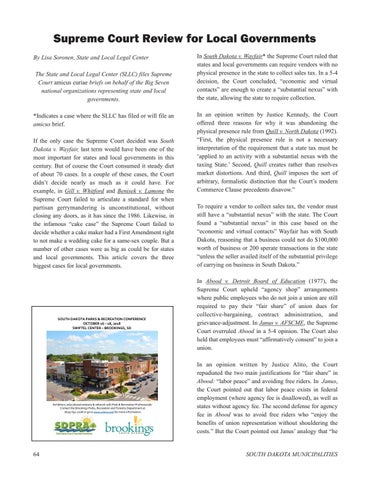Supreme Court Review for Local Governments By Lisa Soronen, State and Local Legal Center The State and Local Legal Center (SLLC) files Supreme Court amicus curiae briefs on behalf of the Big Seven national organizations representing state and local governments. *Indicates a case where the SLLC has filed or will file an amicus brief. If the only case the Supreme Court decided was South Dakota v. Wayfair, last term would have been one of the most important for states and local governments in this century. But of course the Court consumed it steady diet of about 70 cases. In a couple of these cases, the Court didn’t decide nearly as much as it could have. For example, in Gill v. Whitford and Benisek v. Lamone the Supreme Court failed to articulate a standard for when partisan gerrymandering is unconstitutional, without closing any doors, as it has since the 1986. Likewise, in the infamous “cake case” the Supreme Court failed to decide whether a cake maker had a First Amendment right to not make a wedding cake for a same-sex couple. But a number of other cases were as big as could be for states and local governments. This article covers the three biggest cases for local governments.
SOUTH DAKOTA PARKS P & RECREATION CONFERENCE OC CTOBER 16 Ȃ 18, 2018 SWIFTEL L CENTER Ȃ BROOKINGS, SD
Exhibitors, educational sessions s & network with Park & Recreation Professionalss. Contact the Brookings Parks, Recreation and For o estry Department at (605) 692-2708 or go to www.sdpra.com for more information.
64
In South Dakota v. Wayfair* the Supreme Court ruled that states and local governments can require vendors with no physical presence in the state to collect sales tax. In a 5-4 decision, the Court concluded, “economic and virtual contacts” are enough to create a “substantial nexus” with the state, allowing the state to require collection. In an opinion written by Justice Kennedy, the Court offered three reasons for why it was abandoning the physical presence rule from Quill v. North Dakota (1992). “First, the physical presence rule is not a necessary interpretation of the requirement that a state tax must be ‘applied to an activity with a substantial nexus with the taxing State.’ Second, Quill creates rather than resolves market distortions. And third, Quill imposes the sort of arbitrary, formalistic distinction that the Court’s modern Commerce Clause precedents disavow.” To require a vendor to collect sales tax, the vendor must still have a “substantial nexus” with the state. The Court found a “substantial nexus” in this case based on the “economic and virtual contacts” Wayfair has with South Dakota, reasoning that a business could not do $100,000 worth of business or 200 sperate transactions in the state “unless the seller availed itself of the substantial privilege of carrying on business in South Dakota.” In Abood v. Detroit Board of Education (1977), the Supreme Court upheld “agency shop” arrangements where public employees who do not join a union are still required to pay their “fair share” of union dues for collective-bargaining, contract administration, and grievance-adjustment. In Janus v. AFSCME, the Supreme Court overruled Abood in a 5-4 opinion. The Court also held that employees must “affirmatively consent” to join a union. In an opinion written by Justice Alito, the Court repudiated the two main justifications for “fair share” in Abood: “labor peace” and avoiding free riders. In Janus, the Court pointed out that labor peace exists in federal employment (where agency fee is disallowed), as well as states without agency fee. The second defense for agency fee in Abood was to avoid free riders who “enjoy the benefits of union representation without shouldering the costs.” But the Court pointed out Janus’ analogy that “he
SOUTH DAKOTA MUNICIPALITIES














